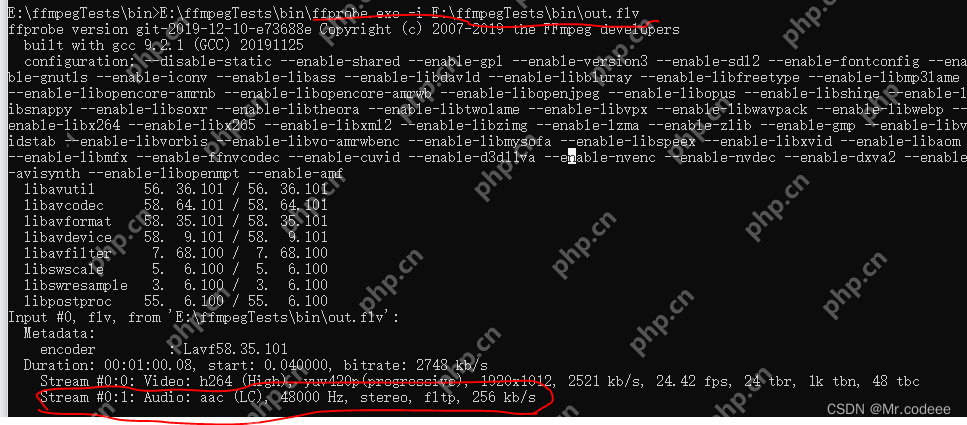使用ffmpeg实现一个播放器的想法虽然不新颖,但在嵌入式linux上通过ffmpeg的代码接口实现,并使用alsa接口输出音频,还是有一定挑战和趣味性的。以下是对原文的伪原创处理:
实现一个嵌入式Linux上的音频播放器,支持mp3、aac和wav格式的文件,是一个有趣的项目。基于ffmpeg的强大功能,我们可以实现这个播放器,主要利用ffmpeg的协议处理和音频解码能力。尽管网上有很多相关代码,但由于版本差异,接口存在变化,实际实现时仍需花费不少时间调试。
总结几点关键经验:
- 多参考官方示例程序,路径为ffmpeg-4.1.9/tmp/share/ffmpeg/examples。
- avcodec_open2函数调用失败时,需使用avcodec_parameters_to_context函数将找到的音频解码器复制到解码器上下文中。
- av_read_frame函数可能会导致内存泄漏,应使用av_packet_unref(&input_packet)函数释放内存。
- 要枚举ALSA播放设备,可使用snd_device_name_get_hint函数。
- avcodec_receive_frame函数接收解码后的帧,只需申请一次内存,AVFrame *pframeSRC = av_frame_alloc()。
使用的是ffmpeg-4.1.9版本,编译选项如下:
//fdk-aac
root@lyz-VirtualBox:/home/lyz/work/broadcast_app/app/thirds_libs_src/fdk-aac/build# vim arm-gcc-cxx11.cmake
root@lyz-VirtualBox:/home/lyz/work/broadcast_app/app/thirds_libs_src/fdk-aac/build# cmake -DCMAKE_TOOLCHAIN_FILE=/home/lyz/work/broadcast_app/app/thirds_libs_src/fdk-aac/build/arm-gcc-cxx11.cmake ../
-- The C compiler identification is GNU 6.4.1
root@lyz-VirtualBox:/home/lyz/work/broadcast_app/app_linux# cat /home/lyz/work/broadcast_app/app/thirds_libs_src/fdk-aac/build/arm-gcc-cxx11.cmake
# Sample toolchain file for building with gcc compiler
# Typical usage:
# *) cmake -H. -B_build -DCMAKE_TOOLCHAIN_FILE="${PWD}/toolchains/gcc.cmake"
SET(CMAKE_SYSTEM_NAME Linux)
set(CMAKE_SYSTEM_PROCESSOR arm)
# set compiler
set(CMAKE_C_COMPILER arm-openwrt-linux-gnueabi-gcc)
set(CMAKE_CXX_COMPILER arm-openwrt-linux-gnueabi-g++)
set(CONFIGURE_OPTS --enable-static=yes --enable-shared=no --disable-shared)
# set c++ standard
set(CMAKE_CXX_STANDARD 11)
set(CMAKE_CXX_STANDARD_REQUIRED ON)
set(CMAKE_CXX_EXTENSIONS OFF)
//mp3
/home/lyz/work/broadcast_app/app/thirds_libs_src/lame-3.100
./configure --host=arm-openwrt-linux-gnueabi --prefix=${PWD}/build/
./configure --target-os=linux --prefix=/home/lyz/work/broadcast_app/app_linux/thirds_libs_src/ffmpeg-4.1.9/tmp --disable-shared --disable-muxers --enable-pic --enable-static --enable-gpl --enable-nonfree --enable-ffmpeg --disable-debug --disable-filters --disable-encoders --disable-hwaccels --enable-static --enable-libmp3lame --enable-demuxers --enable-parsers --enable-protocols --disable-x86asm --disable-stripping --extra-cflags='-I/home/lyz/work/broadcast_app/app_linux/libs/include/ -I/home/lyz/work/broadcast_app/app_linux/libs/include/lame -Os -fpic ' --extra-ldflags='-ldl -lm -L/home/lyz/work/broadcast_app/app_linux/libs/' --enable-decoder=aac --enable-swresample --enable-decoder=ac3在cpp文件中引用ffmpeg库时,如果出现链接错误,需要在头文件包含处添加两个前缀:
//.cpp #include#ifdef __cplusplus extern "C" { #endif #include "libavutil/time.h" #include "libavformat/avformat.h" #include "libavcodec/avcodec.h" #include "libavdevice/avdevice.h" #include "libswresample/swresample.h" #include "libswscale/swscale.h" #ifdef __cplusplus } #endif
即使修改了头文件包含方式,仍然可能出现链接错误,这与链接库的顺序有关。错误的库链接顺序如下:
LDFLAGS += -L ./libs/ -lavcodec -lavfilter -lavformat -lavutil -lpostproc -lswscale -lswresample -lfdk-aac -lmp3lame
正确的库链接顺序应为:
LDFLAGS += -Wl,-Bstatic -L./libs -lavformat -lavcodec -lswscale -lswresample -lavutil -lavfilter -lavdevice -lpostproc -lfdk-aac -lmp3lame
注意动态链接和静态链接的区别:
LDFLAGS += -Wl,-Bstatic -L./libs -lavformat -lavcodec -lswscale -lswresample -lavutil -lavfilter -lavdevice -lpostproc -lfdk-aac -lmp3lame LDFLAGS += -Wl,-Bdynamic -ldl -lm -lasound -lpthread
在处理内存泄漏问题时,可以使用valgrind工具进行检测:
root@lyz-VirtualBox:/home/lyz/work/broadcast_app/app_linux# valgrind ./bas ./Test1.wav 0
最后,使用ALSA接口完整播放mp3文件声音的代码如下:
//static const char *device = "hw:1,0"; /* playback device "hw:0,0" */
static snd_pcm_format_t format = SND_PCM_FORMAT_S16; /* sample format */
static unsigned int rate = 44100; /* stream rate */
static unsigned int channels = 2; /* count of channels */
static unsigned int buffer_time = 500000; /* ring buffer length in us */
static unsigned int period_time = 100000; /* period time in us */
static int resample = 1; /* enable alsa-lib resampling */
static snd_pcm_sframes_t buffer_size;
static snd_pcm_sframes_t period_size;
snd_pcm_access_t mode = SND_PCM_ACCESS_RW_INTERLEAVED;
static snd_output_t *output = NULL;
/*配置参数*/
static int set_hwparams(snd_pcm_t *handle,snd_pcm_hw_params_t *params,snd_pcm_access_t access){
unsigned int rrate;
snd_pcm_uframes_t size;
int err, dir = 0;
/* choose all parameters */
err = snd_pcm_hw_params_any(handle, params);
if (err < 0) {
printf("Broken configuration for playback: no configurations available: %s\n", snd_strerror(err));
return err;
}
/* set hardware resampling */
err = snd_pcm_hw_params_set_rate_resample(handle, params, resample);
if (err < 0) {
printf("Resampling setup failed for playback: %s\n", snd_strerror(err));
return err;
}
/* set the interleaved read/write format */
err = snd_pcm_hw_params_set_access(handle, params, access);
if (err < 0) {
printf("Access type not available for playback: %s\n", snd_strerror(err));
return err;
}
/* set the sample format */
err = snd_pcm_hw_params_set_format(handle, params, format);
if (err < 0) {
printf("Sample format not available for playback: %s\n", snd_strerror(err));
return err;
}
/* set the count of channels */
err = snd_pcm_hw_params_set_channels(handle, params, channels);
if (err < 0) {
printf("Channels count (%i) not available for playbacks: %s\n", channels, snd_strerror(err));
return err;
}
/* set the stream rate */
rrate = rate;
err = snd_pcm_hw_params_set_rate_near(handle, params, &rrate, 0);
if (err < 0) {
printf("Rate %iHz not available for playback: %s\n", rate, snd_strerror(err));
return err;
}
if (rrate != rate) {
printf("Rate doesn't match (requested %iHz, get %iHz)\n", rate, err);
return -EINVAL;
}
/* set the buffer time */
err = snd_pcm_hw_params_set_buffer_time_near(handle, params, &buffer_time, &dir);
if (err < 0) {
printf("Unable to set buffer time %i for playback: %s\n", buffer_time, snd_strerror(err));
return err;
}
err = snd_pcm_hw_params_get_buffer_size(params, &buffer_size);
if (err < 0) {
printf("Unable to get buffer size for playback: %s\n", snd_strerror(err));
return err;
}
printf("buffer_size = %ld\n", buffer_size);
/* set the period time */
err = snd_pcm_hw_params_set_period_time_near(handle, params, &period_time, &dir);
if (err < 0) {
printf("Unable to set period time %i for playback: %s\n", period_time, snd_strerror(err));
return err;
}
err = snd_pcm_hw_params_get_period_size(params, &period_size, &dir);
if (err < 0) {
printf("Unable to get period size for playback: %s\n", snd_strerror(err));
return err;
}
printf("period_size = %ld\n", period_size);
/* write the parameters to the driver */
err = snd_pcm_hw_params(handle, params);
if (err < 0) {
printf("Unable to set hw params for playback: %s\n", snd_strerror(err));
return err;
}
return 0;
}
int test_play_mp3(int argc, char *argv[]){
int rc;
int size;
int got_picture;
int nb_data;
bool pkt_pending = false;
int audio_stream_idx;
char **hints, **n;
char *alsa_device_name;
if (argc < 2) {
printf("Usage: %s \n", argv[0]);
return 1;
}
AVFormatContext *infmt_ctx = NULL;
AVPacket *input_packet = av_packet_alloc();
AVFrame *pframeSRC = av_frame_alloc();
AVFrame *pframePCM = av_frame_alloc();
int ret;
if ((ret = snd_pcm_open(&handle, device, SND_PCM_STREAM_PLAYBACK, 0)) < 0) {
printf("Playback open error: %s\n", snd_strerror(ret));
return ret;
}
if ((err = snd_pcm_hw_params_malloc(¶ms)) < 0) {
printf("Cannot allocate hardware parameter structure (%s)\n", snd_strerror(err));
return err;
}
if ((err = set_hwparams(handle, params, mode)) < 0) {
printf("Setting of hwparams failed: %s\n", snd_strerror(err));
snd_pcm_hw_params_free(params);
snd_pcm_close(handle);
return err;
}
if ((err = snd_pcm_sw_params_malloc(&swparams)) < 0) {
printf("Cannot allocate software parameters structure (%s)\n", snd_strerror(err));
return err;
}
if ((err = set_swparams(handle, swparams)) < 0) {
printf("Setting of swparams failed: %s\n", snd_strerror(err));
snd_pcm_sw_params_free(swparams);
snd_pcm_hw_params_free(params);
snd_pcm_close(handle);
return err;
}
if ((err = snd_pcm_prepare(handle)) < 0) {
printf("Cannot prepare audio interface for use (%s)\n", snd_strerror(err));
return err;
}
printf("Try to open the device for playback - success\r\n");
snd_pcm_close (pcm);
pcm = NULL;
alsa_device_name = name;
break;
}
printf("found device:%s\r\n", alsa_device_name);
//break;
}}
n++;
}
printf("Playback device is %s\n", alsa_device_name);
/* Install error handler after enumeration, otherwise we'll get many
* error messages about invalid card/device ID.
*/
snd_lib_error_set_handler(alsa_error_handler);
err = snd_device_name_free_hint((void**)hints);
err = snd_output_stdio_attach(&output, stdout, 0);
if (err < 0) {
printf("Attach output failed: %s\n", snd_strerror(err));
return err;
}
if ((ret = avformat_open_input(&infmt_ctx, argv[1], NULL, NULL)) < 0) {
fprintf(stderr, "Could not open input file '%s' (error '%s')\n", argv[1], av_err2str(ret));
return ret;
}
infmt_ctx->max_analyze_duration = 5*AV_TIME_BASE;
//读取一部分视音频流并且获得一些相关的信息
ret=avformat_find_stream_info(infmt_ctx, NULL);
if (ret < 0) {
fprintf(stderr, "Could not find stream information\n");
avformat_close_input(&infmt_ctx);
return ret;
}
audio_stream_idx = av_find_best_stream(infmt_ctx, AVMEDIA_TYPE_AUDIO, -1, -1, NULL, 0);
if (audio_stream_idx < 0) {
fprintf(stderr, "Could not find any audio stream in the file\n");
avformat_close_input(&infmt_ctx);
return -1;
}
AVCodecParameters *pCodecParameters = infmt_ctx->streams[audio_stream_idx]->codecpar;
if (pCodecParameters == NULL){
printf("pCodecParameters is NULL\n");
avformat_close_input(&infmt_ctx);
return -1;
}
//找到解码器
const AVCodec* decodec = avcodec_find_decoder(pCodecParameters->codec_id);
if (!decodec) {
printf("not find decoder codec audio_stream_idx:%d codec_id:%d\n", audio_stream_idx, pCodecParameters->codec_id);
avformat_close_input(&infmt_ctx);
return -1;
}
AVCodecContext *decodec_ctx = avcodec_alloc_context3(decodec);
if (!decodec_ctx) {
printf("Can't allocate decoder context\n");
avformat_close_input(&infmt_ctx);
return AVERROR(ENOMEM);
}
if(avcodec_parameters_to_context(decodec_ctx, pCodecParameters) < 0) {
printf("Could not copy codec parameters to context\n");
avcodec_free_context(&decodec_ctx);
avformat_close_input(&infmt_ctx);
return -1;
}
pkt_timebase = infmt_ctx->streams[audio_stream_idx]->time_base;
#if 0
decodec_ctx->sample_rate = pCodecParameters->sample_rate;
decodec_ctx->sample_fmt = (AVSampleFormat)pCodecParameters->format ;
decodec_ctx->channels = pCodecParameters->channels;
decodec_ctx->channel_layout = pCodecParameters->channel_layout;
#endif
//打开解码器
ret = avcodec_open2(decodec_ctx, decodec, NULL);
if (ret < 0) {
printf("Could not open codec\n");
avcodec_free_context(&decodec_ctx);
avformat_close_input(&infmt_ctx);
return ret;
}
pframePCM->format = AV_SAMPLE_FMT_S16;
pframePCM->channel_layout = AV_CH_LAYOUT_STEREO;
pframePCM->sample_rate = rate;
pframePCM->nb_samples = period_size;
pframePCM->channels = channels;
av_frame_get_buffer(pframePCM, 0);
#else
uint8_t *converted_input_samples = NULL;
int converted_input_samples_size = av_samples_alloc(&converted_input_samples, NULL, channels , period_size, AV_SAMPLE_FMT_S16, 0);
#endif
struct SwrContext *pcm_convert_ctx = swr_alloc();
if (!pcm_convert_ctx) {
printf("Could not allocate resampler context\n");
free(buffer);
return -1;
}
swr_alloc_set_opts(pcm_convert_ctx,
AV_CH_LAYOUT_STEREO,
AV_SAMPLE_FMT_S16,
pframePCM->sample_rate,
av_get_default_channel_layout(decodec_ctx->channels),
decodec_ctx->sample_fmt,
decodec_ctx->sample_rate,
0,
NULL);
ret = swr_init(pcm_convert_ctx);
if (ret < 0) {
printf("Could not open resampler context\n");
swr_free(&pcm_convert_ctx);
free(buffer);
return -1;
}
pframeSRC->format = (AVSampleFormat)pCodecParameters->format ;
pframeSRC->channel_layout = decodec_ctx->channel_layout;
pframeSRC->sample_rate = decodec_ctx->sample_rate;
pframeSRC->nb_samples = (20*decodec_ctx->sample_rate * channels * 2) / 8000;;
pframeSRC->channels = channels;
av_frame_get_buffer(pframeSRC, 0);
#endif
int finished = 0;
int decode_ret = 0;
int data_size = av_get_bytes_per_sample(decodec_ctx->sample_fmt);
printf("data_size:%d, frame_size:%d, dst_samples:%d\n", data_size, pCodecParameters->frame_size, pframePCM->nb_samples);
while (!finished) {
ret=av_read_frame(infmt_ctx, input_packet);
if (ret != 0) {
if (ret == AVERROR_EOF){
finished = 1;
break;
}
printf("fail to read_frame\n");
break;
}
//avcodec_send_packet/avcodec_receive_frame
//解码获取初始音频
ret = avcodec_send_packet(decodec_ctx, input_packet);
if (ret == AVERROR(EAGAIN)) {
pkt_pending = true;
continue;
}
if (ret < 0) {
printf("Error sending a packet for decoding\n");
break;
}
pkt_pending = false;
while (ret >= 0) {
ret = avcodec_receive_frame(decodec_ctx, pframeSRC);
if (ret == AVERROR(EAGAIN) || ret == AVERROR_EOF) {
break;
} else if (ret < 0) {
printf("Error during decoding\n");
break;
}
int source_samples = pframeSRC->nb_samples;
int out_samples = source_samples;
// uint8_t *write_2_pcm = NULL;
if (out_samples != pframePCM->nb_samples){
no_resample = 1;
//读取到一帧音频或者视频
//MP3->PCM,ret=swr_convert(pcm_convert_ctx, pframePCM->data, pframePCM->nb_samples,(const uint8_t **)pframeSRC->extended_data, pframeSRC->nb_samples);
if (ret < 0) {
printf("[1]source_samples:%d, pframeSRC->nb_samples:%d,ret:%d\n", source_samples, pframeSRC->nb_samples, ret);
continue;
} else {
//printf("[2]out_samples:%d, pframeSRC->nb_samples:%d,ret:%d\n", source_samples, pframeSRC->nb_samples, ret);
}
write_2_pcm = pframePCM->data[0];
nb_data = ret;
} else {
printf("out_samples:%d, pframeSRC->nb_samples:%d \n", out_samples, pframeSRC->nb_samples );
nb_data = out_samples;
write_2_pcm = pframeSRC->data[0];
}
//向硬件写入音频数据
rc = snd_pcm_writei(handle, write_2_pcm, out_samples);
if (rc == -EPIPE) {
printf("underrun occurred\n");
err=snd_pcm_prepare(handle);
if(err < 0) {
printf("Can't recovery from underrun, prepare failed: %s\n", snd_strerror(err));
break;
}
}
if (rc < 0) {
printf("write to audio interface failed (%s)\n", snd_strerror(rc));
break;
}
if (rc != out_samples) {
printf("short write, write %d frames\n", rc);
}
av_packet_unref(input_packet);
}
}
if (pcm_convert_ctx) {
swr_free(&pcm_convert_ctx);
}
av_packet_free(&input_packet);
if (pframeSRC) {
av_frame_free(&pframeSRC);
}
#if 1
if (pframePCM) {
av_frame_free(&pframePCM);
}
#endif
if(decodec_ctx != NULL){
avcodec_close(decodec_ctx);
avcodec_free_context(&decodec_ctx);
}
if (infmt_ctx != NULL) {
avformat_close_input(&infmt_ctx);
avformat_free_context(infmt_ctx);
}
snd_pcm_drain(handle);
snd_pcm_close(handle);
//free(converted_input_samples);
free(buffer);
free(alsa_device_name);
return 0;
} 参考:https://www.php.cn/link/94a5313663ab243911f0da89ed1096db
下一步计划是实现对rtsp流的请求。
2022/11/28更新:实现rtsp播放器,只需将播放路径直接设置为rtsp地址,操作非常简单!
































